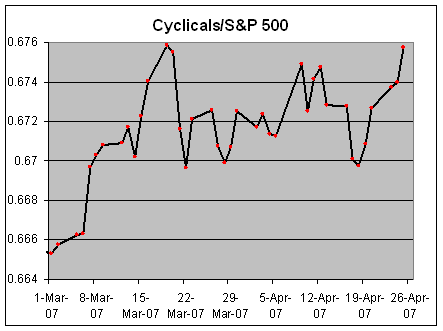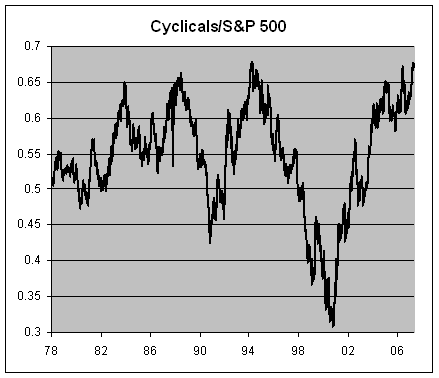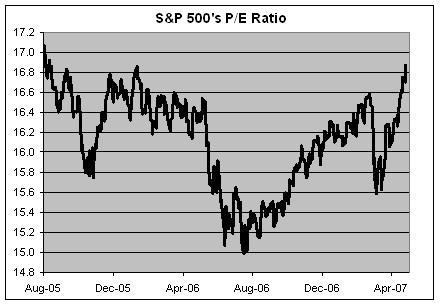Archive for April, 2007
-
Sysco’s Earnings
Eddy Elfenbein, April 30th, 2007 at 11:49 pmThe Dow was in the black for much of Monday, but after about 2:30, it slipped into negative territory and eventually finished 58 points lower. That ended the Dow’s chances of marking an historic first—20 of 22 up days.
Before the bell, Sysco (SYY) reported earnings of 35 cents a share. That was a nice improvement over last year’s total of 30 cents, but it was a penny short of Wall Street’s forecast. The market wasn’t pleased and the shares tumbled 4.6% lower. That seems like an overreaction. Nothing seems to be going Sysco’s way this year. The stock is down nearly 11% for 2007. That’s unusual for a stock that’s historically been so stable.
I also noticed that our favorite micro-cap, Nicholas Financial (NICK), seems to be waking up. The stock doesn’t normally move very much, but it rose 4% on Friday and another 2.6% today. That’s a lot for NICK. Both days had much higher-than-normal trading volume. The company should be reporting earnings soon, but it hasn’t said what day yet. -
20 of 22 Up Days for the Dow
Eddy Elfenbein, April 30th, 2007 at 11:02 amThe Dow is currently up 22 points. If this holds, it will be the first time in the Dow’s 111-year history that it rallied 20 times in 22 sessions.
-
Wanted: Berkshire CIO
Eddy Elfenbein, April 30th, 2007 at 8:13 amGet your resumes in!
Warren Buffett is hiring his replacement:With Mr. Munger’s help, Mr. Buffett will whittle down the current contenders to about 20 “real possibilities,” he says, adding that he’ll start reading the letters in earnest after Berkshire’s annual shareholders’ meeting next weekend. From those 20, he will ask for personal investment records going back at least 10 years. Then, after determining whether “the general attitude toward purchase and sale of securities is compatible” with Berkshire, he will fill the job with either one or two people. He plans to hand them up to $10 billion to manage until it is time for them to take over the entire portfolio.
Mr. Buffett explains that the purpose of the trial run is “to see if their decision-making apparatus works out, hopefully while I’m still alive.”
What it isn’t, however, is a mentorship program, something many applicants have misinterpreted. He says he isn’t looking for someone to teach, but “for someone who already knows how to do it.”
The misunderstanding is reflected in dozens of letters from students, professional investors and a surprising number of engineers and lawyers hoping to be apprenticed to the master. “I assure you,” wrote one 20-year-old college student, “although I may be short on experience, I am very long on potential.” A lawyer in Oregon recommended his four-year-old son, characterizing the toddler as a “great negotiator” on issues such as “bedtime, chores, allowance, baths, etc.” -
Erin Brockovich, Corporate Exec
Eddy Elfenbein, April 30th, 2007 at 7:47 am
Here’s a strange one. Remember that Erin Brockovich chick? Julia Roberts got an Oscar for playing her. Anyway, it turns out she’s now a veep at Save the World Air Inc. (ZEROE.OB).
No, I’m serious.
(Via Altucher & Stockerblog.) -
Taxes around the World.
Eddy Elfenbein, April 28th, 2007 at 10:15 pmCitizens for Tax Justice looks at taxes around the world.

(Via Greg Mankiw.) -
Euro So Beautiful
Eddy Elfenbein, April 28th, 2007 at 10:04 pmThe euro hit a record high against the dollar. Jurgen Reinhoudt says this is good for the prestige of Europe, but not so good for its economy:
If the Euro eclipses the U.S. dollar as a reserve currency, the value of the Euro could appreciate still further, making European exports even more expensive than they are now (in addition to causing severe troubles for the United States). In French political terms, this would be a highly undesirable development given that “an exchange rate of $1.40 would endanger” the survival of Airbus. As Airbus struggles “to meet $220bn of dollar contracts from an operation with euro labour costs,” the heat is on. No French political leader would tolerate Airbus going bankrupt, certainly not if a bankruptcy were caused by a European exchange rate considered to be abnormally high.
But a Euro worth more than $1.40 (or even $1.50) would not just be problematic for Airbus or French exporters. True, Germany and countries that are economically closely linked to it (such as the Netherlands) have the ability to withstand the pressure of an expensive Euro, but France, Spain, and Italy do not.
A Euro worth more than $1.40 would cause significant difficulties for Mediterranean countries in general—potentially re-launching the political debate over the mandate of the European Central Bank, something that both Sarkozy and Royal have hinted at.
Unlike the American Fed, which has as a goal to keep growth high, unemployment low, and inflation low, the task of the European Central Bank is simply to keep inflation low, even if this adversely affects economic growth. If European growth were to falter and the Euro were to rise even further in value, many politicians from Southern Europe and France will put heavy pressure on the ECB to lower interest rates. This would lower the value of the Euro but also lead to higher inflation, the mortal enemy of the ECB. It would have all the makings of a fascinating financial feud.
The discomfort brought about by the Euro’s “low” value to the dollar was mostly a matter of prestige. Now that the Euro is worth far more than the dollar and still rising in prestige (and value), its value is becoming a matter of tangible economic and political concern. Stay tuned. -
65 Years Ago Today
Eddy Elfenbein, April 27th, 2007 at 2:01 pmThis is a big year for stock market history buffs. In 2007, we’re celebrating the 100th anniversary of the Panic of 1907 (okay, maybe not celebrate), the 75th anniversary of the 1932 low, the 25th anniversary of the 1982 bull market and the 20th anniversary of the 1987 crash. It’s also been five years since the 2002 low and ten years since the East Asian financial crisis. All in all, happy times for the market history crowd.
Tomorrow will mark another milestone—65 years since the 1942 low. On April 28, 1942, The Dow bottomed at 92.92.
That’s not just low. It’s low, low, loooow. The market was still reeling from Pearl Harbor, and the country was starting to realize how much work lay ahead. The only good news was Jimmy Doolittle’s daring raid over Tokyo ten days before.
But think about how investors must have felt. This was 13 years after 1929, yet the market was still just one-quarter of its peak. The Dow was even 10% below its level from January 1906, more than 36 years before! That would be like the Dow today trying to break 770.
The night, FDR gave a fireside chat detailing his economic policy for the war. This is part of what he said:
You do not have to be a professor of mathematics or economics to see that if people with plenty of cash start bidding against each other for scarce goods, the price of those goods (them) goes up.
Yesterday I submitted to the Congress of the United states a seven-point program, a program of general principles which taken together could be called the national economic policy for attaining the great objective of keeping the cost of living down. I repeat them now to you in substance:
First. we must, through heavier taxes, keep personal and corporate profits at a low reasonable rate.
Second. We must fix ceilings on prices and rents.
Third. We must stabilize wages.
Fourth. We must stabilize farm prices.
Fifth. We must put more billions into War Bonds.
Sixth. We must ration all essential commodities which are scarce.
Seventh. We must discourage installment buying, and encourage paying off debts and mortgages.
I do not think it is necessary to repeat what I said yesterday to the Congress in discussing these general principles. The important thing to remember is that earn one of these points is dependent on the others if the whole program is to work.
Some people are already taking the position that every one of the seven points is correct except the one point which steps on their own individual toes. A few seem very willing to approve self-denial — on the part of their neighbors. The only effective course of action is a simultaneous attack on all of the factors which increase the cost of living, in one comprehensive, all-embracing program covering prices, and profits, and wages, and taxes and debts.
The blunt fact is that every single person in the United States is going to be affected by this program. Some of you will be affected more directly by one or two of these restrictive measures, but all of you will be affected indirectly by all of them. Are you a business man, or do you own stock in a business corporation? Well, your profits are going to be cut down to a reasonably low level by taxation. Your income will be subject to higher taxes. Indeed in these days, when every available dollar should go to the war effort, I do not think that any American citizen should have a net income in excess of $25,000 per year after payment of taxes.
Good golly! Can you imagine any politician giving a speech like that?
In today’s terms, $25,000 is about $315,000.
I would hardly say this speech was the catalyst, but the market did indeed take off. This was probably the greatest long-term bull market in history.
Within two years, the Dow was up 50%, and it doubled by 1945. By 1955, the Dow was up fivefold, and it doubled again ten years later. The market really didn’t see any pause until 1966 when inflation started to have a major impact. Twenty four years after FDR’s speech, the Dow had advanced close to 1,000% and that’s not counting dividends.
-
First-Quarter GDP Report
Eddy Elfenbein, April 27th, 2007 at 9:53 am
The government reported today that the economy grew at an annualized rate of just 1.26% for the first three months of the year. That’s pretty weak. It’s the slowest quarter in four years.
I’m also troubled by the trend. This marks the fourth straight quarter of below-trend growth (the long-term trend is about 3%).
GDP data is very trend-sensitive. If the economy is growing by over 3%, it tends to stay that way. In the late 1990s, we had 18 straight quarters of over 2.6% growth. If it’s under 3%, it also tends to stay that way. In the early part of this decade, we had 11 straight quarters of under 2.8%.
The breakout points are very important. -
The Cyclical Rally Lives
Eddy Elfenbein, April 26th, 2007 at 2:43 pmThe rally in cyclical stocks is still going strong. Last month, I pointed out that on March 19, the ratio of the Morgan Stanley Cyclical Index (^CYC) versus the S&P 500 reached a 13-year high.
The ratio backed off some afterward as the cyclicals slightly underperformed the overall market. But that changed last week. This recent leg of the bull market has been greatly helped by the cyclicals. Yesterday, the overall CYC reached an all-time as it closed over 1,000 for the first time.
The CYC-to-S&P ratio has now fully recovered and it close to making another 13-year high. In fact, it’s not too far from taking out the 1994 high as well.
Here’s a look at how the ratio has done over the past few weeks:

And here’s how the ratio has done over the last 30 years:

Update: It happened. The ratio made a new 13-year high today. The S&P 500 closed 0.08% lower while the CYC rose 0.02%. -
P/E Ratios Are at a 20-Month High
Eddy Elfenbein, April 26th, 2007 at 1:55 pm
Thanks to yesterday’s surge, the P/E ratio of the S&P 500 is up to 16.87 (I use smoothed operating earnings). That’s the highest it’s been since August 2005.
Still, it’s hardly excessive but we’re starting to see the impact of slower earnings growth. At the start of the year, first-quarter earnings were projected to be up 8.7%. They’ll probably be up 4% to 5%. Fortunately, most of the damage is confined to the autos and homebuilders.
So far.
-
-
Archives
- April 2025
- March 2025
- February 2025
- January 2025
- December 2024
- November 2024
- October 2024
- September 2024
- August 2024
- July 2024
- June 2024
- May 2024
- April 2024
- March 2024
- February 2024
- January 2024
- December 2023
- November 2023
- October 2023
- September 2023
- August 2023
- July 2023
- June 2023
- May 2023
- April 2023
- March 2023
- February 2023
- January 2023
- December 2022
- November 2022
- October 2022
- September 2022
- August 2022
- July 2022
- June 2022
- May 2022
- April 2022
- March 2022
- February 2022
- January 2022
- December 2021
- November 2021
- October 2021
- September 2021
- August 2021
- July 2021
- June 2021
- May 2021
- April 2021
- March 2021
- February 2021
- January 2021
- December 2020
- November 2020
- October 2020
- September 2020
- August 2020
- July 2020
- June 2020
- May 2020
- April 2020
- March 2020
- February 2020
- January 2020
- December 2019
- November 2019
- October 2019
- September 2019
- August 2019
- July 2019
- June 2019
- May 2019
- April 2019
- March 2019
- February 2019
- January 2019
- December 2018
- November 2018
- October 2018
- September 2018
- August 2018
- July 2018
- June 2018
- May 2018
- April 2018
- March 2018
- February 2018
- January 2018
- December 2017
- November 2017
- October 2017
- September 2017
- August 2017
- July 2017
- June 2017
- May 2017
- April 2017
- March 2017
- February 2017
- January 2017
- December 2016
- November 2016
- October 2016
- September 2016
- August 2016
- July 2016
- June 2016
- May 2016
- April 2016
- March 2016
- February 2016
- January 2016
- December 2015
- November 2015
- October 2015
- September 2015
- August 2015
- July 2015
- June 2015
- May 2015
- April 2015
- March 2015
- February 2015
- January 2015
- December 2014
- November 2014
- October 2014
- September 2014
- August 2014
- July 2014
- June 2014
- May 2014
- April 2014
- March 2014
- February 2014
- January 2014
- December 2013
- November 2013
- October 2013
- September 2013
- August 2013
- July 2013
- June 2013
- May 2013
- April 2013
- March 2013
- February 2013
- January 2013
- December 2012
- November 2012
- October 2012
- September 2012
- August 2012
- July 2012
- June 2012
- May 2012
- April 2012
- March 2012
- February 2012
- January 2012
- December 2011
- November 2011
- October 2011
- September 2011
- August 2011
- July 2011
- June 2011
- May 2011
- April 2011
- March 2011
- February 2011
- January 2011
- December 2010
- November 2010
- October 2010
- September 2010
- August 2010
- July 2010
- June 2010
- May 2010
- April 2010
- March 2010
- February 2010
- January 2010
- December 2009
- November 2009
- October 2009
- September 2009
- August 2009
- July 2009
- June 2009
- May 2009
- April 2009
- March 2009
- February 2009
- January 2009
- December 2008
- November 2008
- October 2008
- September 2008
- August 2008
- July 2008
- June 2008
- May 2008
- April 2008
- March 2008
- February 2008
- January 2008
- December 2007
- November 2007
- October 2007
- September 2007
- August 2007
- July 2007
- June 2007
- May 2007
- April 2007
- March 2007
- February 2007
- January 2007
- December 2006
- November 2006
- October 2006
- September 2006
- August 2006
- July 2006
- June 2006
- May 2006
- April 2006
- March 2006
- February 2006
- January 2006
- December 2005
- November 2005
- October 2005
- September 2005
- August 2005
- July 2005
 Eddy Elfenbein is a Washington, DC-based speaker, portfolio manager and editor of the blog Crossing Wall Street. His
Eddy Elfenbein is a Washington, DC-based speaker, portfolio manager and editor of the blog Crossing Wall Street. His